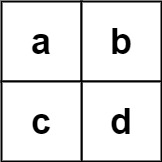Description
Given an m x n board of characters and a list of strings words, return all words on the board.
Each word must be constructed from letters of sequentially adjacent cells, where adjacent cells are horizontally or vertically neighboring. The same letter cell may not be used more than once in a word.
Example 1:

Input: board = [[“o”,“a”,“a”,“n”],[“e”,“t”,“a”,“e”],[“i”,“h”,“k”,“r”],[“i”,“f”,“l”,“v”]], words = [“oath”,“pea”,“eat”,“rain”] Output: [“eat”,“oath”]
Example 2:

Input: board = [[“a”,“b”],[“c”,“d”]], words = [“abcb”] Output: []
Constraints:
m == board.lengthn == board[i].length1 <= m, n <= 12board[i][j]is a lowercase English letter.1 <= words.length <= 3 * 1041 <= words[i].length <= 10words[i]consists of lowercase English letters.- All the strings of
wordsare unique.
Code
Backtracking (TLE)
使用 Word Search 當骨幹,套一層,會 TLE。
class Solution {
public:
vector<string> findWords(vector<vector<char>>& board, vector<string>& words) {
vector<string> res;
for(auto w: words) {
if(exist(board, w)) res.push_back(w);
}
return res;
}
bool exist(vector<vector<char>>& board, string word) {
int m = board.size();
int n = board[0].size();
for(int i = 0; i < m; i++) {
for(int j = 0; j < n; j++) {
if(dfs(board, word, 0, i, j, m, n))
return true;
}
}
return false;
}
bool dfs(vector<vector<char>>& board, string& word, int index, int i, int j, int& m, int& n) {
if(index == word.length() - 1 && board[i][j] == word[index]) return true;
if(word[index] != board[i][j] || board[i][j] == '*') return false;
if(board[i][j] == word[index]) {
char temp = board[i][j];
// backtracking
board[i][j] = '*';
bool down = i + 1 < m ? dfs(board, word, index+1, i + 1, j, m, n) : false;
bool up = i - 1 >= 0 ? dfs(board, word, index+1, i - 1, j, m, n) : false;
bool right = j + 1 < n ? dfs(board, word, index+1, i, j + 1, m, n) : false;
bool left = j - 1 >= 0 ? dfs(board, word, index+1, i, j - 1, m, n) : false;
// backtracking
board[i][j] = temp;
return down || up || right || left;
} else {
return false;
}
}
};To check if the current path exists any word, we can build Trie structure, which can prune early when the current path is not a prefix of any words in our Trie.
Backtracking with Trie (Early Pruning)
Early Pruning: if(board[i][j] == '#' || t->children[board[i][j] - 'a'] == nullptr) return;
class Trie {
public:
Trie* children[26];
string* word;
Trie() {
this->word = nullptr;
for(int i = 0; i < 26; i++) {
this->children[i] = nullptr;
}
}
void addWord(string& word) {
Trie* cur = this;
for(char c: word) {
c -= 'a';
if(cur->children[c] == nullptr) {
cur->children[c] = new Trie();
}
cur = cur->children[c];
}
cur->word = &word;
}
};
class Solution {
public:
vector<string> findWords(vector<vector<char>>& board, vector<string>& words) {
Trie t;
for(string& w: words)
t.addWord(w);
vector<string> res;
int m = board.size();
int n = board[0].size();
for(int i = 0; i < m; i++) {
for(int j = 0; j < n; j++) {
dfs(board, i, j, m, n, &t, res);
}
}
return res;
}
void dfs(vector<vector<char>>& board, int i, int j, int m, int n, Trie* t, vector<string>& res) {
if(board[i][j] == '#' || t->children[board[i][j] - 'a'] == nullptr) return;
t = t->children[board[i][j] - 'a'];
if(t->word != nullptr) {
res.push_back(*(t->word));
t->word = nullptr; // avoid duplicate
}
char temp = board[i][j];
board[i][j] = '#';
if(i + 1 < m) dfs(board, i + 1, j, m, n, t, res);
if(i - 1 >= 0) dfs(board, i - 1, j, m, n, t, res);
if(j + 1 < n) dfs(board, i, j + 1, m, n, t, res);
if(j - 1 >= 0) dfs(board, i, j - 1, m, n, t, res);
board[i][j] = temp;
}
};